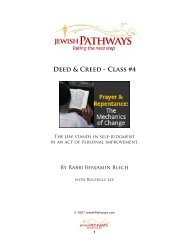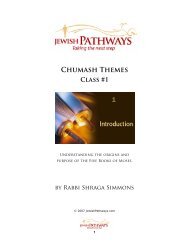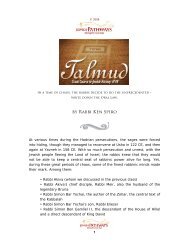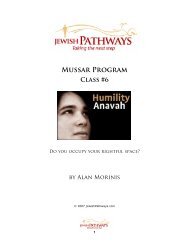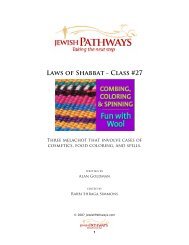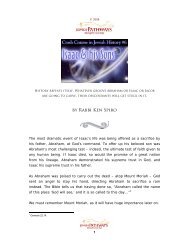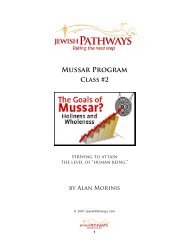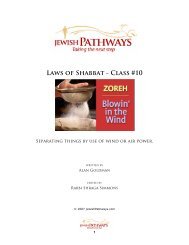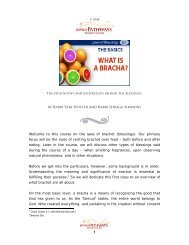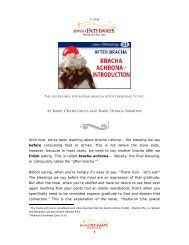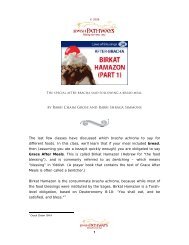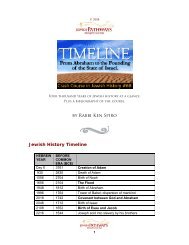PDF: this entire class - JewishPathways.com
PDF: this entire class - JewishPathways.com
PDF: this entire class - JewishPathways.com
Create successful ePaper yourself
Turn your PDF publications into a flip-book with our unique Google optimized e-Paper software.
Daily Living - Class #26<br />
Halacha guides every moment of our lives.<br />
based on the research of<br />
Rabbi Dov Lev<br />
This <strong>class</strong> contains multi-media segments<br />
that are available online.<br />
© 2007 <strong>JewishPathways</strong>.<strong>com</strong><br />
1
Waking Up<br />
We all need sleep to reinvigorate our tired bodies and give us strength<br />
to make the most out of life. But we should not overdo it. Each person<br />
should sleep the minimum amount necessary to be healthy and<br />
productive. 1 In any case, a healthy person should not indulge in more<br />
than eight hours of sleep each night. 2<br />
“One should strengthen himself like a lion to get up in the morning to<br />
serve his Creator.” These are the opening words of the Shulchan<br />
Aruch, the standard code of Jewish law. A Jew should not be lazy, but<br />
rather have an excited, upbeat attitude about the up<strong>com</strong>ing morning<br />
prayers, and toward life in general.<br />
The Talmud says that since a person’s soul goes up to heaven each<br />
night, sleep is “one-sixtieth of death.” 3 The day should begin by<br />
contemplating God’s kindness of allowing him to awake, refreshed and<br />
revitalized. 4 As such, you should recite “Modeh Ani” immediately, even<br />
before washing your hands. 5<br />
1<br />
Mishnah Berurah 238:2. Great scholars used to train their bodies to need very little sleep. The legendary Vilna<br />
Gaon slept only two hours each day, and never for more than half an hour consecutively! (Introduction to Bi’ur<br />
HaGra on Shulchan Aruch)<br />
2<br />
Rambam (Deyot 4:4)<br />
3<br />
Brachot 57b<br />
4<br />
Kitzur Shulchan Aruch 1:2<br />
5<br />
Mishnah Berurah 1:8<br />
2
Netilat Yadayim<br />
The Sages decreed that every Jew must wash his hands upon<br />
awakening. This process is called netilat yadayim. A number of<br />
reasons are given for <strong>this</strong> practice:<br />
• During the night, it is assumed that a person’s hands will have<br />
touched some unclean part of his body. Therefore, everyone must<br />
wash his hands before praying. 6<br />
• We sanctify our hands as we celebrate the “new life” with which we<br />
were endowed upon awakening. 7<br />
• Netilat yadayim serves to remove the tumah, the negative<br />
spirituality that cleaves to a person when he is asleep. 8<br />
Water may be left under a bed to be used for netilat yadayim in the<br />
morning, though it is preferable to cover it. 9 It is forbidden to leave<br />
food or drink underneath the bed in which you sleep, as the tumah<br />
emitted from slumbering people has a negative spiritual impact on the<br />
food. 10<br />
It is ideal to wash your hands as soon as you wake up, to remove the<br />
tumah as soon as possible. 11 This washing is done without saying a<br />
blessing. Then, after relieving oneself and/or getting dressed, a person<br />
should wash again with the blessing. 12<br />
Before washing netilat yadayim, you should try not to directly touch<br />
the water you plan to use for netilat yadayim. 13<br />
6<br />
Mishnah Berurah 4:1<br />
7<br />
Mishnah Berurah 4:1<br />
8<br />
According to Mishnah Berurah 4:8, <strong>this</strong> reason is secondary, and not the basis for the decree.<br />
9<br />
Shu”t Shevet HaLevi 3:23.3<br />
10<br />
Yoreh De’ah 116:5<br />
11<br />
Magen Avraham 4:1<br />
12<br />
Mishnah Berurah 4:4; see Shu”t Yabia Omer 5:1<br />
13<br />
As heard from Rav Yitzchak Berkovits<br />
3
Ideally, a Jew (even a child) who has not yet performed netilat<br />
yadayim, should not directly touch any food. There is no problem of a<br />
non-Jew handling food without washing netilat yadayim, since he is<br />
not required to do so. 14<br />
One must be careful not to touch any of the openings of his body<br />
before washing netilat yadayim. 15<br />
The washing process is as follows:<br />
• Fill a large cup.<br />
• First pour water on your right hand and then on your left<br />
hand.<br />
• Repeat <strong>this</strong> process for a total of three times on each hand. 16<br />
Ideally, wash your <strong>entire</strong> hand up to the wrist. However, if <strong>this</strong> is<br />
impossible, it is sufficient to wash the fingers up until the knuckles. 17 If<br />
your hand is bandaged, you need to only wash your healthy hand. 18<br />
One’s hands should be washed in a place that is clean and odorless.<br />
Today, most private bathrooms meet <strong>this</strong> standard. The problem<br />
arises when using a public bathroom – e.g. in an airplane.<br />
If you have difficulty procuring a utensil with which to wash, you may<br />
wash with tap water by turning on the tap three times over each<br />
hand. 19<br />
After performing netilat yadayim in the morning, it is proper to wash<br />
one’s face 20 and rinse one’s mouth. 21<br />
One should dry his hands and face on a towel. 22 To dry them on a<br />
garment is considered undignified and is forbidden. 23<br />
14<br />
Mishnah Berurah 4:10<br />
15<br />
Orach Chaim 4:3<br />
16<br />
Orach Chaim 4:2 and Mishnah Berurah<br />
17<br />
Mishnah Berurah 4:38<br />
18<br />
Shu”t Yechaveh Daat 2:19<br />
19<br />
Yalkut Yosef (Shearit Yosef 1:4:8)<br />
20<br />
Yalkut Yosef (Shearit Yosef, vol. I, pg. 70); cf. Orach Chaim 46:1<br />
21<br />
Orach Chaim 4:17<br />
22<br />
Orach Chaim 4:20<br />
23<br />
Mishnah Berurah 158:45); Shemirat HaGuf ViHanefesh (ch. 57)<br />
4
Immediately after washing your hands, recite the blessing. 24<br />
Alternatively, you may recite the blessing in the synagogue along with<br />
the other morning blessings. 25 The blessing should be recited outside<br />
the bathroom.<br />
The Restroom<br />
Holding back from relieving himself when needed is harmful to one’s<br />
health, and is thus forbidden. 26 It is certainly forbidden to pray, recite<br />
blessings or study Torah in such a state. However, if the need is not<br />
pressing and you are in the middle of studying Torah, you need not<br />
interrupt your studies immediately. 27<br />
Even in the bathroom, dignity and privacy must be maintained. 28 (See<br />
“Daily Living - Kosher Clothes” for a discussion of the Jewish concept<br />
of dignity.)<br />
From a Jewish perspective, every place has appropriate and<br />
inappropriate behavior. A bathroom is for taking care of bodily needs.<br />
Since a bathroom is intrinsically an unclean place, many things are<br />
considered out-of-place or even profane to do there:<br />
24<br />
Orach Chaim 4:1<br />
25<br />
Orach Chaim 6:2<br />
26<br />
Talmud - Tamid 27b; Orach Chaim 3:17<br />
27<br />
Yalkut Yosef (Shearit Yosef 1:3:15)<br />
28<br />
Orach Chaim 3:2<br />
5
• It is forbidden to bring food or drink in the bathroom. If food was<br />
brought there, it may be eaten after it has been taken out. 29<br />
• It is improper to engage in conversation in the bathroom. 30 However,<br />
if there is something pressing that needs to be said, you may do so<br />
providing that you are not involved in relieving yourself. 31 Similarly,<br />
you may answer your cellular phone if you are concerned that it may<br />
be an important call. In such a case, the conversation should be kept<br />
to a minimum. 32<br />
• It is forbidden to utter any Name of God in a bathroom. Even the<br />
word “Shalom” is considered a name of God, as is evident from Judges<br />
6:24. However, one may utter <strong>this</strong> word if referring to a person named<br />
Shalom. 33<br />
• It is prohibited to contemplate matters of Torah in the bathroom. 34<br />
One may, however, think about giving charity 35 or how to perform acts<br />
of kindness for other people. 36 There are also stories of great Torah<br />
scholars who studied scientific topics when in the bathroom. 37<br />
After relieving oneself, the blessing Asher Yatzar is recited immediately<br />
upon exiting the restroom (after washing). 38 If you forgot to do so, you<br />
may still recite it for up to 72 minutes, providing you do not yet feel<br />
the urge to relieve yourself again. 39 The text of the blessing appears<br />
on the following page.<br />
Since <strong>this</strong> blessing thanks God for the wonders of the human body,<br />
reciting it with proper intent is considered a merit for good health. 40<br />
29<br />
Shu”t Yabia Omer 4:5<br />
30<br />
Rema - Orach Chaim 3:2<br />
31<br />
Mishnah Berurah 3:4<br />
32<br />
Yalkut Yosef (Shearit Yosef 1:3:3)<br />
33<br />
Orach Chaim 84:1, Mishnah Berurah 84:6<br />
34<br />
Orach Chaim 85:2<br />
35<br />
Yalkut Yosef (Shearit Yosef 1:3:3)<br />
36<br />
As heard from Rav Yitzchak Berkovits<br />
37<br />
The Vilna Gaon (Rabbi Eliyahu Kramer) authored the mathematical work, Ayil Meshulash during his time in<br />
the bathroom. Some also attribute the mathematical theorem, Cramer’s Rule, to him. See www.wikipedia.org<br />
(Vilna Gaon).<br />
38<br />
Mishnah Berurah 8:6<br />
39<br />
Shu”t Yechaveh Daat 4:5<br />
40<br />
Sefer VaHarachata Yamim 159, by Rabbi Yaakov Chizkiyahu Fish<br />
6
Asher Yatzar<br />
After using the bathroom, wash your hands and say:<br />
Båruch Atå Adonoy,<br />
Eloheinu Melech hå’olåm,<br />
asher yåtzar et hå’ådåm b’chåchmå,<br />
u’vårå voe n’kåvim n’kåvim<br />
chalulim chalulim.<br />
Gålui v’yådu’ah lifnei chisei ch’voe’decha,<br />
she’im yipå’taye’ach echåd may’hem,<br />
oe yiså’tame echåd may’hem,<br />
ee efshar l’hit’kayaim v’la’amode l’fånechå.<br />
Båruch Atå Adonoy,<br />
rofay chol båsår u’mafli la’asote.<br />
Blessed are You, Lord our God, King of the universe,<br />
Who fashioned man with wisdom, and created<br />
within him many openings and many cavities.<br />
It is obvious and known before Your throne of glory,<br />
that if but one of them were to be ruptured,<br />
or but one of them were to be blocked, it would<br />
be impossible to survive and to stand before You.<br />
Blessed are You, God, Who heals all f lesh and acts wondrously.



